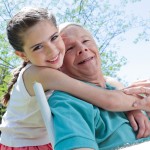A stroke can be a life-altering event, not just for the survivor but also for their family members. Elderly stroke survivors often rely on their loved ones for support and care during the recovery process. If you find yourself in the role of a family caregiver, it's essential to understand how to provide the best care and support for your loved one. This guide offers information and valuable tips to help you navigate this challenging journey.
 1. Educate yourself:
1. Educate yourself:Understanding the nature of stroke, its effects, and the recovery process is crucial. Familiarize yourself with the specific type of stroke your loved one experienced and its potential impact on their abilities and cognitive functions. Knowledge is your best ally.
Effective communication is key to providing support. Encourage open and honest dialogue with your loved one. Listen to their concerns, feelings, and preferences. This will help you understand their needs better and make them feel valued.
Ask questions regarding retirement homes to our experts
Collaborate with healthcare professionals, such as doctors, nurses, and therapists, to ensure your loved one receives the necessary medical care and therapy. They can offer valuable insights, recommendations, and guidance on the recovery process.
Modify the home environment to ensure it's safe for your loved one. Remove tripping hazards, install handrails, and make necessary adjustments to facilitate mobility. Assistive devices, like grab bars and shower chairs, can enhance safety.
Many elderly stroke survivors require multiple medications. Help your loved one manage their prescriptions, ensuring they take the right doses at the right times. Keep an organized record of medications, and be aware of potential side effects.
Stroke recovery can be physically and emotionally challenging. Encourage and assist your loved one with exercises and therapies recommended by healthcare professionals. Offer emotional support by being patient, compassionate, and empathetic.
While it's essential to provide assistance, it's equally important to encourage your loved one's independence. Encourage them to participate in daily activities and therapy exercises to the best of their ability.
Caring for an elderly stroke survivor can be emotionally and physically draining. Don't hesitate to seek respite care when needed. Taking short breaks will help you recharge and provide better care in the long run.
Many stroke survivors experience depression and anxiety. Be vigilant for signs of emotional distress and seek professional help when necessary. Encourage your loved one to engage in activities they enjoy.
Consider joining support groups or online communities for caregivers. These platforms offer a sense of community, valuable advice, and a space to share experiences and challenges with others in a similar situation.
In conclusion, being a family caregiver for an elderly stroke survivor can be challenging, but it's a role filled with love and support. Remember to take care of yourself, seek help when needed, and maintain open communication with your loved one and healthcare professionals. Your dedication and compassion play a vital role in their recovery journey, contributing to their well-being and quality of life after a stroke.
Don't hesitate to contact us at 343 309 5289. We can help you choose the right establishment for you and assist you in your search.

Find a suitable senior residence